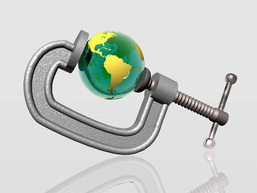 This issue begins a series intended to picture a world that is improving quality of life while consuming far fewer natural resources. Can you help us visualize this very different future?
This issue begins a series intended to picture a world that is improving quality of life while consuming far fewer natural resources. Can you help us visualize this very different future?
Doing better while using less – much, much less – is simple to understand, but it bucks existing systems of thought in business and economics that assume endless economic expansion. That assumption underpins many more assumptions made daily and often unconsciously.
Assumptions are concise versions of stories that we tell ourselves. If the world is finite and we can’t grow forever, our old stories are delusional. We need new stories – fast.
Stories stir emotions. Stories integrate multiple strands of thought. They juice up dry facts making them easy to interpret. We begin educating our children with stories. For adults, science fiction helps us imagine the future – and maybe the present.
Stories buttress how we live in industrial economies, relying on transactions and credit to obtain food, clothing, and shelter, creating very few basics for ourselves. We go into hock for vehicles to go to work to earn more cash to buy more stuff. Then we pile on more debt to build more space to store more stuff pulled out of the great market in the sky. 24/7 saturation marketing constantly sucks us into the great vortex of consumption.
Business news hangs on every statistical economic harbinger, assuming that mere slowing of this money whirl portends economic disaster. Having forgotten how we once lived with much less consumption, we struggle to imagine how a more technological world can live well using a lot less stuff.
We need stories that describe how, real stories about real people if possible because they are credible. However, realistic scenarios fire imagination.
Sites like Green Biz carry many environmental stories daily. Many only describe how to be less profligate. Others tout technologies to preserve the expansionary vortex, trusting in “the market” to balance of the triple bottom line of profit, people, and planet.
In practice, giving the planet #1 priority in personal and economic decisions is too depressing for serious contemplation. If all one can imagine is jobs, companies, agencies, and professions going away, one turns to denial stories. They are easier to imagine.
Deniers of all problems environmental invent stories that in their minds refute almost any environmental evidence. The most paranoid frame nearly all these stories in two basic beliefs. One is that businesses exist only to make money for ownership, so all they can imagine is conspiracies to deprive them of freedom, wealth, and rights of ownership.
A second belief is that all humans are “born bad,” suspect until proven trustworthy. This distrust makes it easy to categorize everyone as friend or foe, and it slows reception to open dialog. A contrasting belief is that other humans mean well until they prove otherwise. Collaboration comes easier and lasts longer if it sprouts from that root.
Attacking basic beliefs only provokes resistance. Instead, we seek new stories that weaken nostalgia for the old and fear of the new.
The science supporting the obvious axiom that the planet is finite is complex. Many interrelated limitations make a slow crunch inevitable, but a story going in all directions is also hard to get in mind. Distilling the story into a core actionable belief that we can live well using a lot less simplifies the message and dispels a lot of doom and gloom. We can even contemplate how to make a technological economy symbiotic with its ecosystem.
A transition to Compression Thinking has to make a general axiom actionable. For example, if we measure success by quality rather than quantity, leaders should set examples: no huge compensation packages; no lavish consumption, no big quantity discount sales. If long-term resilience is more important than short-term growth, abandon financial growth formulas in favor of durability estimates, including perpetuation of life cycle cradle-to-cradle time. Question reliance on labor productivity; land and energy productivity may be far more vital. Should we redefine work? If so, how?
Stories can range from how to absolve obligations to stranded capital to how to cut household water use by 90%. Desire is only that they illustrate Compression Thinking.
Partly because of Doc Hall recovering from an accident, the Institute has kicked this can far too long. Will you help move us along? Opt into any or all of the following steps:
1. Write about a 1000 word story about a world in Compression. It can be real or it can be a realistic projection. Send it to doc@compression.org. (Imagining your community becoming symbiotic with its ecosystem may be easier than imagining your company doing so.)
We will post stories and projections in this newsletter. Perhaps we can collectively assemble a clearer picture of where we are headed and how to take action. For more information to prompt ideas see the companion piece Telling New Stories.
2. If you would like to form a group to project how to cope with Compression, let Doc know (doc@compression.org). We have some ideas on how to do this virtually, by holding web meetings on a series of topics and hosting discussion groups about them.
3. If you would spend $1000 to attend a four-day highly interactive workshop the second week of August, let Doc know that too. We are testing whether this idea is feasible.
4. We are now tax-exempt so we are asking for donations. We too are flooded with pleas for money, and we advocate doing better with less. However, in a cash economy, doing almost anything requires seed money. To contribute, please go to the donate button at www.compression.org.
